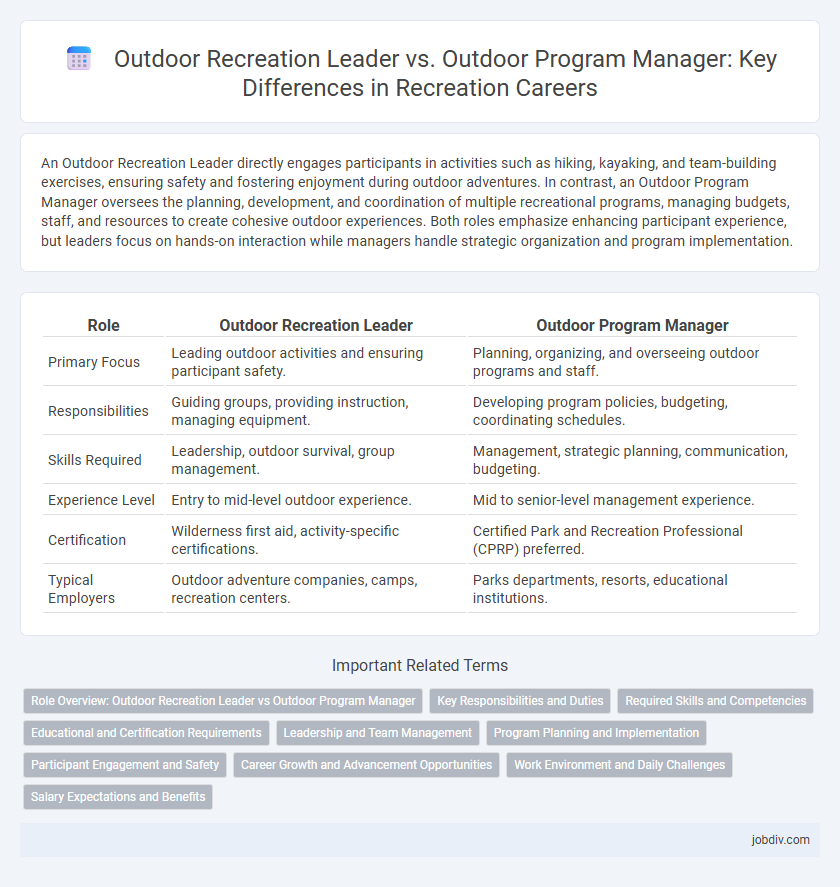An Outdoor Recreation Leader directly engages participants in activities such as hiking, kayaking, and team-building exercises, ensuring safety and fostering enjoyment during outdoor adventures. In contrast, an Outdoor Program Manager oversees the planning, development, and coordination of multiple recreational programs, managing budgets, staff, and resources to create cohesive outdoor experiences. Both roles emphasize enhancing participant experience, but leaders focus on hands-on interaction while managers handle strategic organization and program implementation.
Table of Comparison
| Role | Outdoor Recreation Leader | Outdoor Program Manager |
|---|---|---|
| Primary Focus | Leading outdoor activities and ensuring participant safety. | Planning, organizing, and overseeing outdoor programs and staff. |
| Responsibilities | Guiding groups, providing instruction, managing equipment. | Developing program policies, budgeting, coordinating schedules. |
| Skills Required | Leadership, outdoor survival, group management. | Management, strategic planning, communication, budgeting. |
| Experience Level | Entry to mid-level outdoor experience. | Mid to senior-level management experience. |
| Certification | Wilderness first aid, activity-specific certifications. | Certified Park and Recreation Professional (CPRP) preferred. |
| Typical Employers | Outdoor adventure companies, camps, recreation centers. | Parks departments, resorts, educational institutions. |
Role Overview: Outdoor Recreation Leader vs Outdoor Program Manager
Outdoor Recreation Leaders directly facilitate adventure activities, guide participants, and ensure safety during outdoor excursions. Outdoor Program Managers oversee the planning, budgeting, and coordination of multiple outdoor activities, developing strategic programs that align with organizational goals. Leaders focus on hands-on execution in natural settings, while managers handle administrative responsibilities and resource allocation.
Key Responsibilities and Duties
Outdoor Recreation Leaders supervise and guide participants in activities like hiking, kayaking, and team-building exercises, ensuring safety and skill development. Outdoor Program Managers oversee planning, budgeting, and coordination of multiple outdoor programs, managing staff and resources to achieve organizational goals. Leaders focus on direct participant engagement, while Managers handle administrative strategy and program expansion.
Required Skills and Competencies
Outdoor Recreation Leaders require strong interpersonal and communication skills to engage participants and ensure safety during activities. Outdoor Program Managers need advanced organizational abilities, strategic planning, and leadership competencies to develop, coordinate, and oversee comprehensive outdoor programs. Both roles demand expertise in risk management, outdoor activity facilitation, and environmental awareness to promote engaging and safe recreational experiences.
Educational and Certification Requirements
Outdoor Recreation Leaders typically require certifications in first aid, CPR, and outdoor safety, often supported by a degree or coursework in recreation, education, or environmental science. Outdoor Program Managers generally hold advanced degrees in recreation management, outdoor education, or business administration, alongside certifications in risk management, program coordination, and leadership. Both roles demand ongoing professional development, but Program Managers face higher educational and certification standards due to their responsibility for overseeing multiple programs and ensuring regulatory compliance.
Leadership and Team Management
Outdoor Recreation Leaders specialize in direct leadership, guiding groups through activities like hiking, camping, and adventure sports while ensuring participant safety and engagement. Outdoor Program Managers oversee multiple leaders and coordinate overall program logistics, including scheduling, budgeting, and compliance with safety regulations. Their team management involves strategic planning, staff training, and evaluating program effectiveness to enhance participant experiences and organizational goals.
Program Planning and Implementation
Outdoor Recreation Leaders specialize in direct program planning and implementation, focusing on organizing activities, ensuring participant safety, and facilitating engagement in outdoor experiences. Outdoor Program Managers oversee broader program development, including strategic planning, resource allocation, staff supervision, and evaluation of program effectiveness. Both roles require expertise in outdoor education and leadership, but managers emphasize administrative coordination and long-term program sustainability.
Participant Engagement and Safety
Outdoor Recreation Leaders specialize in direct participant engagement, guiding activities and ensuring individual safety through hands-on supervision and risk management techniques. Outdoor Program Managers focus on overseeing multiple programs, establishing safety protocols, and coordinating staff to maintain a secure environment while enhancing participant experience. Both roles are critical in promoting safe, enjoyable outdoor recreation, with Leaders emphasizing active interaction and Managers prioritizing strategic safety management.
Career Growth and Advancement Opportunities
Outdoor Recreation Leaders typically gain hands-on experience leading activities and managing participant safety, building foundational skills that support career growth into supervisory or specialized roles. Outdoor Program Managers oversee multiple recreation activities and staff, making strategic decisions that enhance program quality and community engagement, often leading to higher-level administrative or director positions. Advancing from leader to manager roles requires strong leadership, program development expertise, and a proven ability to coordinate resources effectively for increased organizational impact.
Work Environment and Daily Challenges
Outdoor Recreation Leaders typically operate directly in field settings such as parks, campsites, or adventure trails, managing daily activities and ensuring participant safety in dynamic, unpredictable environments. Outdoor Program Managers work primarily in administrative offices or visitor centers, coordinating resources, staff, and program logistics to support multiple recreation sites while addressing budget constraints and regulatory compliance. Both roles require adaptability, but Leaders face immediate physical safety challenges while Managers handle strategic planning and stakeholder communication.
Salary Expectations and Benefits
Outdoor Recreation Leaders typically earn between $35,000 and $50,000 annually, focusing on direct participant engagement and activity supervision, while Outdoor Program Managers command higher salaries ranging from $55,000 to $80,000, reflecting their managerial responsibilities and program development roles. Benefits for Outdoor Program Managers often include comprehensive health insurance, retirement plans, and professional development funds, contrasted with more basic benefits packages offered to Outdoor Recreation Leaders. Salary expectations for both positions vary based on geographic location, organizational size, and level of experience, with management roles offering greater financial incentives and job security.
Outdoor Recreation Leader vs Outdoor Program Manager Infographic

 jobdiv.com
jobdiv.com